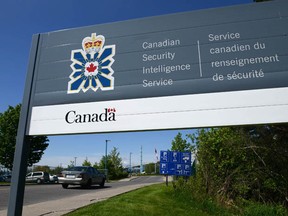Adorable Monkey Shocks Police and Zoo After Calling Emergency Services
Can CSIS spy on Canadians overseas? Regime asks top courtroom how it can legally track terror suspects
At issue is what legal steps must exist taken to enlist allies to help with foreign tracking of Canadians, and how forthcoming CSIS must be with federal judges

The Canadian Security Intelligence Service has been left in the dark nearly the legality of tracking Canadian terror suspects overseas, the federal authorities is telling the Supreme Court.
In arguments filed with the high court, the regime says CSIS needs "certainty" as to how information technology tin can monitor possible Canadian extremists who venture abroad.
Federal lawyers are asking the Supreme Courtroom to settle the thing, proverb lower courts fabricated "pregnant errors" in dealing with this "highly sensitive area."
Security agencies are feverishly investigating radicalized Canadians who caput overseas with the aim of joining Islamic extremists. Officials fear boxing-hardened jihadis could return to Canada to plot attacks.
At upshot is what legal steps must be taken to enlist Canada's closest allies to help with foreign tracking of Canadians, and how forthcoming CSIS must be with federal judges when seeking such powers.
"In the struggle against terrorism, Canada must pay close attention to the threatening activities of its own citizens, wherever they may be," says the federal brief filed in the Supreme Courtroom.
Certainty as to how it tin can engage in that monitoring according to law is a matter of public importance
"Certainty as to how it can engage in that monitoring according to law is a matter of public importance."
The government submitted the arguments secretly in late September. They were unsealed recently following the release of the public version of a Federal Court of Appeal ruling in the long-running matter.
It could be weeks or fifty-fifty months before the Supreme Court decides whether to hear the case.
Meantime, the Conservatives have introduced legislation that would amend the CSIS Act by explicitly allowing the spy service to seek a warrant to investigate a security threat beyond Canada's borders.
However, Public Safety Minister Steven Blaney says the government withal wants the Supreme Court to clarify "important questions of law."
In a pivotal late 2013 ruling, Federal Court Justice Richard Mosley criticized CSIS over a asking for warrants to track two Canadians with technical assist from the Communications Security Establishment Canada, the country's electronic spy agency.
Mosley said CSIS breached its duty of candour past declining to disembalm that CSEC's strange counterparts in the Five Eyes intelligence network could be called upon to help monitor the Canadians.
He also warned CSIS and CSEC were incurring the adventure that Canadian targets "may be detained or otherwise harmed" as a result of the use of the intercepted communications by foreign agencies.
The Federal Court of Appeal upheld Mosley's judgment in a ruling handed downwardly in July just made public in censored form just this month.
In its brief to the Supreme Court, the government says if CSIS and the attorney general are to be taken to task for a lack of candour, there must be clear guidance on the telescopic of disclosure required. "With respect, a legal basis for demanding such disclosure has not been shown, and no articulate guidance has been given to foreclose future misunderstandings."
The Court of Appeal declared that a warrant is required when CSIS — either directly or through the auspices of a foreign spy service — uses "intrusive" methods such as interception of telecommunications. It said such warrants could be issued when the interception "is lawful where it occurs."
Federal lawyers say they are left with many questions about what the appeal court meant.
"CSIS must exist able to carry out its crucial function in gathering intelligence on threats to the security of Canada confident that they are acting within the law, and the public is also entitled to know what constraints are imposed on CSIS in this regard," says the federal submission.
It is expected that an amicus curiae, or friend of the court, volition make opposing arguments in the awarding for a high court hearing. The amicus would go on in the role if the Supreme Court agrees to take the case.
The authorities says the example could generally be argued in an open up hearing. However, some evidence might be filed in secret due to national security concerns. Every bit a result, some proceedings may become behind closed doors at the request of the parties or the court itself.
Source: https://nationalpost.com/news/canada/can-csis-spy-on-canadians-overseas-government-asks-top-court-how-it-can-legally-track-terror-suspects
Posted by: ethertoncalawn.blogspot.com


0 Response to "Adorable Monkey Shocks Police and Zoo After Calling Emergency Services"
Post a Comment